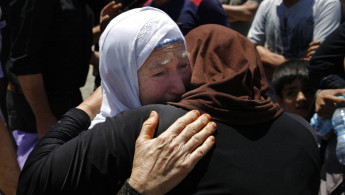Hundreds of Syrian refugees return home from Lebanon despite safety fears
Hundreds of Syrian refugees crossed the border from Lebanon on Saturday, as part of a Russian-brokered plan to repatriate nearly a million Syrian refugees currently residing in Lebanon.
The move, announced on Wednesday after a Russian delegation visited Lebanon, has been met with scepticism from many Syrian refugees, despite promises from Lebanese officials that no refugees who return home will be detained by Bashar al-Assad's regime.
The head of Lebanon's General Security Directorate Major General Abbas Ibrahim called on Syrian refugees to come to the directorate's offices to register their names to return home. He added that the move will eventually end up returning "hundreds of thousands" to their homes.
He said that some delays were caused by vetting those that are wanted back home. "We are insisting that no Syrian refugee returns home and then is detained," Ibrahim told reporters at the border.
Syrian state TV said up to 1,200 Syrians are expected to end up returning on Saturday, adding that more than 30 Syrian buses crossed into Lebanon to bring them back home.
Twitter Post
|
Many have returned from the northeastern Lebanese town of Arsal over the past weeks. Most of those heading home Saturday were coming from the southern Lebanese village of Chebaa.
Lebanese President Michel Aoun said on Friday that the Russian initiative aims to return some 890,000 Syrians from Lebanon.
Beirut is keen to begin a large-scale repatriation process, after the rapid influx of some 1 million Syrian refugees caused a myriad of political, social and economic problems. Lebanon itself has a population of only 4.5 million.
The Russian initiative was proposed following the summit in Helsinki between US President Donald Trump and President Vladimir Putin, although it was not clear whether the US supported the proposal.
Despite the returns being described as voluntary, many are sceptical of the "guarantee" that those returning will not be detained. The Assad regime has well-known for its brutal persecution of those who have voiced - or believed to have - even slight opposition to the government.
An Irish Times report from March this year documents at least four repatriated refugees who were detained and then killed.
Twitter Post
|
It is thought that well over 8,000 detainees have been tortured to death in the Syrian regime security chambers since the conflict began.
Syrian refugees in Jordan have voiced their concern over returning to their homeland before the war has ended and their safety is assured. They are also distrustful of Russia as a peace broker due to its war-mongering role conducting brutal campaigns against those who opposed Assad's rule.
The Russians have launched a vocal campaign for the reconstruction of Syria, aiding Assad to rebuild the country under his control.
Russian Deputy Ambassador Dmitry Polyansky on Friday called on the UN Security Council for global assistance to help Syria's economic recovery and the return of refugees.
"It would be wise for all international partners to join assistance in Syrian recovery efforts, to eschew artificial linkages to political momentum," Polyansky told the council meeting on Syria.
Other countries, however, made clear there will be no reconstruction aid for Syria unless Assad agrees to a political transition that would include a new constitution and elections.
Agencies contributed to this report.
Follow us on Twitter: @The_NewArab





 Follow the Middle East's top stories in English at The New Arab on Google News
Follow the Middle East's top stories in English at The New Arab on Google News


